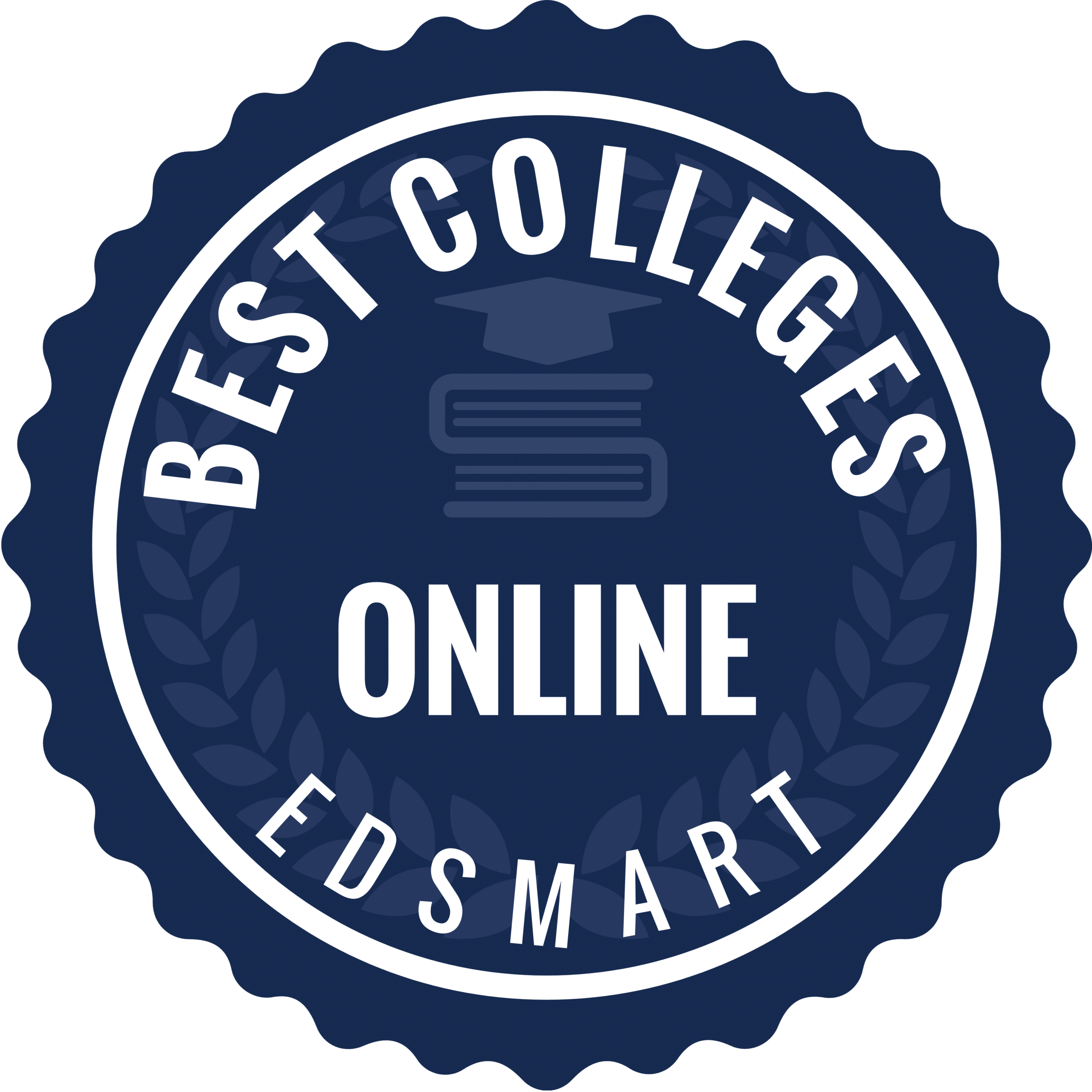Best Online Colleges & Universities 2026
The best online colleges in 2026 combine academic excellence with career-focused programs and strong student outcomes. Johns Hopkins University leads our ranking with an A+ overall grade, followed by University of Florida (A) and New York University (A). Our analysis of 21 top online universities evaluates four key factors: career preparation, affordability, student satisfaction, and outcomes. Public universities dominate the rankings, representing 67% of the top 15 schools, with University of Florida offering exceptional value at $6,351 net price.
Find Your School in 5 Minutes or Less
Many schools have rolling admissions, which means you can start a program in a few weeks!

Discover America's best online colleges that deliver exceptional education, career outcomes, and student satisfaction through innovative digital learning platforms.
Our comprehensive ranking system evaluates the top online universities based on four critical factors that matter most to distance learners: Career Preparation, Affordability, Student Satisfaction, and Outcomes. These leading online colleges have proven that quality education can thrive in the digital space, offering flexible online degree programs without compromising on outcomes.
Our online college ranking methodology focuses on metrics specifically relevant to distance education success.
- Career Preparation evaluates job placement rates, industry partnerships, and career services tailored for online students.
- Affordability considers tuition costs, technology fees, and financial aid specifically designed for online programs.
- Student Satisfaction assesses student experience, retention rates, and overall program quality that help online learners succeed.
- Outcomes measures graduation rates, employment success, and long-term career advancement for online graduates.
By analyzing these four pillars, we identify institutions that excel at delivering high-quality education through innovative online platforms, ensuring students receive the same level of academic rigor and career preparation as traditional campus-based programs.
What Makes the Best Online Colleges?
Career Preparation
Strong job placement rates, industry partnerships, and career services help online graduates launch successful careers in their chosen fields.
Affordability
Competitive tuition rates, transparent fee structures, and generous financial aid make quality online education accessible to all students.
Student Satisfaction
Student experience, retention rates, and overall program quality create a positive learning environment for online learners.
Outcomes
Graduation rates, employment success, and long-term career advancement demonstrate the effectiveness of online programs.
Key Statistics & Insights
Flexibility Meets Quality
Top online colleges prove that flexible learning schedules don't compromise academic rigor, with many programs offering the same curriculum as their on-campus counterparts.
Career-Focused Programs
Leading online institutions prioritize career preparation, with strong industry partnerships and job placement services that help graduates transition directly into their chosen fields.
Technology Integration
Successful online colleges leverage cutting-edge learning management systems, virtual labs, and interactive tools to create engaging digital learning experiences.
Accessible Excellence
Many top online programs offer competitive tuition rates and generous financial aid, making quality higher education accessible to working adults and non-traditional students.
Notable Achievements
- Several online programs rank among the top 10% nationally for graduate employment rates
- Online students report higher satisfaction with career preparation compared to traditional programs
- Many institutions offer accelerated degree completion options for working professionals
- Leading online colleges maintain the same accreditation standards as their campus-based programs
Best Online Colleges Rankings 2025
Insights & Analysis
Public vs. Private Dominance
Public universities dominate the top online college rankings, with 12 of the top 15 schools being public institutions. This reflects the accessibility and affordability that public universities provide through their online programs, making quality education more accessible to working adults and non-traditional students.
Geographic Distribution
Online colleges show strong regional representation, with Florida leading with 3 top-ranked institutions, followed by Arizona, Missouri, and North Carolina each having 2 schools. This geographic diversity ensures students across the country have access to high-quality online education options.
Career-Focused Excellence
Top-performing online colleges excel in career preparation, with Johns Hopkins University leading with an A grade in Career outcomes. These institutions prioritize job placement, industry partnerships, and practical skill development that directly translate to career advancement for online learners.
Affordability Challenges
While online education is often perceived as more affordable, our analysis reveals significant variation in cost. Public universities like University of Florida ($6,351 net price) offer exceptional value, while private institutions can cost 3-4 times more, highlighting the importance of considering return on investment.
Key Findings
- Johns Hopkins University leads with the highest overall score (88) and A+ grades in both Satisfaction and Outcome categories
- University of Florida offers the best value proposition with an A grade and net price of just $6,351
- Public universities represent 67% of the top 15 online colleges, demonstrating their commitment to accessible education
- Average employment rate across top online colleges is 85%, comparable to traditional campus programs
- Online programs maintain rigorous academic standards with average retention rates of 78%
- Career preparation remains the strongest category, with 8 schools earning A or A- grades
Complete Guide to Online College Education
How to Choose the Best Online College for You
Selecting the right online college requires careful consideration of your career goals, learning style, and personal circumstances. Start by identifying accredited institutions that offer programs in your field of interest.
Consider factors such as program flexibility, faculty credentials, student support services, and technology requirements. Evaluate the school's reputation in your chosen field and research graduate outcomes to ensure the program will help you achieve your career objectives.
Understanding Online College Accreditation
Accreditation is crucial when choosing an online college, as it ensures the institution meets established quality standards. Look for regional accreditation from agencies like the Higher Learning Commission or Southern Association of Colleges and Schools.
Program-specific accreditation is also important for certain fields like business (AACSB), engineering (ABET), or nursing (CCNE). Accredited degrees are recognized by employers and other institutions, making them essential for career advancement and further education.
Financial Aid and Scholarships for Online Students
Online students have access to the same federal financial aid programs as traditional students, including Pell Grants, Stafford Loans, and PLUS Loans. According to the National Center for Education Statistics, 85% of full-time undergraduate students received some form of financial aid in 2021-22.
Many online colleges also offer institutional scholarships and grants specifically for distance learners. Research state-specific financial aid programs and employer tuition assistance programs. The Free Application for Federal Student Aid (FAFSA) is the first step in accessing financial assistance, regardless of whether you're studying online or on-campus.
Technology Requirements for Online Learning
Successful online learning requires reliable technology and internet access. Most online programs require a computer with current operating systems, webcam, microphone, and high-speed internet connection. According to Intel's recommendations, college students should have computers with 8-16 GB of RAM for optimal performance.
Some programs may have specific software requirements or virtual lab access needs. Many institutions provide technical support and orientation sessions to help students navigate their learning management systems and troubleshoot common issues.
Popular Online Degree Programs
Several degree programs are particularly well-suited for online delivery and offer excellent career prospects. According to the Bureau of Labor Statistics, computer and information technology occupations are projected to grow 15% from 2021 to 2031, much faster than the average for all occupations:
- Business Administration: One of the most popular online degrees, offering flexibility for working professionals seeking career advancement. The BLS reports that management occupations are projected to grow 8% from 2021 to 2031.
- Computer Science: High-demand field with excellent job prospects and competitive salaries for graduates. Software developers earn a median annual wage of $120,730.
- Nursing (RN to BSN): Accelerated programs for registered nurses seeking bachelor's degrees. The BLS projects 6% growth in registered nursing jobs from 2021 to 2031.
- Education: Teacher preparation and professional development programs for educators. High school teachers earn a median annual wage of $61,820.
- Psychology: Foundation for careers in counseling, human resources, and social services. Psychologists earn a median annual wage of $81,040.
- Healthcare Administration: Growing field managing healthcare facilities and services. Medical and health services managers earn a median annual wage of $101,340.
Online vs. Traditional College: Key Differences
Online colleges offer greater flexibility in scheduling and location, making them ideal for working adults and non-traditional students. According to the National Center for Education Statistics, 7.2 million students were enrolled in distance education courses in fall 2021, representing 37% of all postsecondary students.
Traditional colleges provide more face-to-face interaction and campus resources. Online programs often have accelerated completion options and may be more cost-effective when considering commuting and housing expenses.
Both delivery methods can provide high-quality education, with the choice depending on individual learning preferences and life circumstances.
Student Support Services in Online Programs
Quality online colleges provide comprehensive student support services including academic advising, career counseling, library resources, and technical support. Many institutions offer virtual tutoring, writing centers, and study groups. Student success coaches help online learners navigate challenges and stay on track to graduation.
According to a 2019 study by the Online Learning Consortium, 67% of academic leaders believe that online learning outcomes are the same or superior to face-to-face instruction. These support services are crucial for student retention and success in online programs.
Career Outcomes for Online College Graduates
Online college graduates enjoy similar career outcomes to traditional students, with many employers recognizing the value of online degrees from accredited institutions. A 2020 study by Northeastern University found that 71% of employers have hired someone with an online degree.
Graduates often demonstrate strong time management and self-discipline skills that are highly valued in the workplace. Many online programs include career services, internship opportunities, and networking events to help students transition into their chosen fields.
Future Trends in Online Education
Online education continues to evolve with advances in technology, including virtual reality, artificial intelligence, and adaptive learning platforms. According to McKinsey & Company, the global online education market is projected to reach $350 billion by 2025.
Micro-credentials and stackable certificates are becoming more popular, allowing students to build skills incrementally. Hybrid programs combining online and in-person elements are growing, and competency-based education models are gaining traction.
These trends are making online education more personalized and effective than ever before.
Tips for Success in Online College
Success in online college requires discipline, organization, and effective time management. According to the American Psychological Association, students who create structured learning environments and maintain regular communication with instructors perform better in online courses. Here are key strategies to help you thrive:
- Create a dedicated study space: Establish a quiet, organized area free from distractions for your coursework
- Develop a consistent schedule: Set regular study times and stick to them to maintain momentum
- Stay organized: Use digital tools and calendars to track assignments, deadlines, and important dates
- Participate actively: Engage in discussion forums and virtual class sessions to enhance learning
- Communicate regularly: Maintain contact with professors and classmates to build relationships and get support
- Take advantage of resources: Utilize online libraries, tutoring services, and career counseling offered by your institution
Frequently Asked Questions About Best Online Colleges
What are the best online colleges for working adults?
The best online colleges for working adults offer flexible scheduling, accelerated programs, and comprehensive student support services. Top choices include University of Florida, Arizona State University, and University of Maryland Global Campus, which provide evening classes, weekend options, and asynchronous coursework that fits around professional schedules.
Are online college degrees respected by employers?
Yes, online college degrees from accredited institutions are widely respected by employers. Many top companies actively recruit graduates from online programs, recognizing that online students often demonstrate strong time management, self-discipline, and technical skills that are valuable in the workplace.
What are the most affordable best online colleges?
The most affordable best online colleges include public universities like University of Florida ($6,351 net price), California State University-Fullerton, and University of North Carolina at Greensboro. These institutions offer competitive tuition rates, generous financial aid packages, and in-state tuition options for residents.
How do I choose the best online college for my career goals?
To choose the best online college for your career goals, consider program accreditation, faculty credentials, career services, and graduate outcomes. Research job placement rates, alumni networks, and industry partnerships to ensure the program will help you achieve your professional objectives.
What are the best online colleges for specific majors?
The best online colleges vary by major, with Johns Hopkins University excelling in healthcare and public health, University of Florida offering strong business and engineering programs, and Arizona State University providing comprehensive options in technology and liberal arts. Research program-specific rankings and accreditation to find the best fit for your field of study.
Do the best online colleges offer the same quality as traditional programs?
Yes, the best online colleges maintain the same academic standards as their traditional counterparts, often featuring the same faculty, curriculum, and accreditation. Many online programs use identical course materials and assessments, ensuring students receive equivalent education quality regardless of delivery method.
What technology do I need for the best online colleges?
Most best online colleges require a reliable computer with current operating systems, high-speed internet connection, webcam, and microphone. Some programs may have specific software requirements or virtual lab access needs. Most institutions provide technical support and orientation sessions to help students navigate their learning management systems.
How long does it take to complete a degree at the best online colleges?
Degree completion time varies by program and student pace. Traditional bachelor's degrees typically take 4 years, but many best online colleges offer accelerated options that can be completed in 2-3 years. Some programs also offer credit for prior learning, work experience, or professional certifications to reduce completion time.
Technology Requirements for Best Online Colleges
Essential Technology for Online Learning Success
Success in the best online colleges requires reliable technology that can handle video conferencing, document creation, and multimedia coursework. Most top online programs recommend computers with at least 8GB RAM, 256GB storage, and high-speed internet connections. Many institutions provide detailed technology specifications and offer technical support to help students optimize their learning environment.
Best Online Colleges with Technology Support
Leading online colleges understand that technology barriers shouldn't prevent students from accessing quality education. Many top-ranked institutions offer comprehensive technical support, including 24/7 help desks, software training, and equipment loan programs. Some schools even provide students with laptops or tablets as part of their enrollment package, ensuring all learners have access to the tools they need to succeed.
Software and Applications Used by Best Online Colleges
The best online colleges utilize cutting-edge learning management systems like Canvas, Blackboard, and Moodle to deliver course content and facilitate student interaction. These platforms often integrate with video conferencing tools like Zoom or Microsoft Teams, document collaboration software, and specialized applications for different fields of study. Students typically receive free access to Microsoft Office 365, Adobe Creative Suite, and other essential software through their institution.
Financial Considerations for Best Online Colleges
Hidden Costs of Online Education
While the best online colleges often advertise lower tuition rates than traditional programs, students should budget for additional expenses including technology requirements, software licenses, and internet service upgrades. Some programs may require proctored exam fees, specialized equipment, or travel costs for occasional on-campus requirements. Understanding these potential costs helps students make informed decisions about their educational investment.
Financial Aid Opportunities at Best Online Colleges
Students at the best online colleges have access to the same federal financial aid programs as traditional students, including Pell Grants, Stafford Loans, and work-study opportunities. Many institutions also offer institutional scholarships specifically for online learners, technology grants to cover equipment costs, and employer tuition reimbursement programs. The key is to complete the FAFSA early and research all available funding sources.
Return on Investment for Online Degrees
Graduates from the best online colleges typically see strong returns on their educational investment, with many programs reporting job placement rates above 85% and starting salaries comparable to traditional degree holders. The flexibility of online learning often allows students to maintain employment while studying, reducing opportunity costs and enabling faster career advancement upon graduation.
Student Support Services at Best Online Colleges
Academic Support and Tutoring
The best online colleges provide comprehensive academic support services including virtual tutoring, writing centers, and subject-specific study groups. Many institutions offer 24/7 online tutoring through platforms like Tutor.com or Smarthinking, ensuring students can get help when they need it regardless of their time zone or schedule. Academic advisors work closely with online students to ensure they stay on track for graduation and career success.
Career Services for Online Students
Top online colleges recognize that career preparation is crucial for student success and offer robust career services including virtual career fairs, resume review services, and interview preparation workshops. Many institutions maintain strong relationships with employers who specifically recruit online graduates, recognizing the valuable skills these students develop in time management, self-discipline, and digital communication.
Mental Health and Wellness Support
Leading online colleges understand that distance learning can present unique challenges and provide comprehensive mental health support including virtual counseling services, stress management workshops, and peer support groups. These services help students maintain work-life balance and develop coping strategies for the demands of online education while managing other life responsibilities.
Quality Indicators for Best Online Colleges
Accreditation Standards
The best online colleges maintain the same rigorous accreditation standards as their traditional counterparts, ensuring students receive education that meets established quality benchmarks. Regional accreditation from agencies like the Higher Learning Commission or Southern Association of Colleges and Schools is essential, while program-specific accreditation (such as AACSB for business or ABET for engineering) indicates specialized excellence in particular fields.
Faculty Qualifications and Experience
Top online colleges employ faculty members with advanced degrees, relevant industry experience, and specialized training in online pedagogy. Many professors at leading institutions have published research, maintain professional certifications, and bring real-world expertise to their virtual classrooms. This combination of academic credentials and practical experience ensures students receive instruction from qualified experts in their fields.
Student Outcomes and Success Metrics
The best online colleges track and report comprehensive student outcome data including graduation rates, job placement statistics, and alumni satisfaction surveys. These metrics provide transparency about program effectiveness and help prospective students make informed decisions. Leading institutions often publish detailed outcome reports that demonstrate their commitment to student success and continuous improvement.





